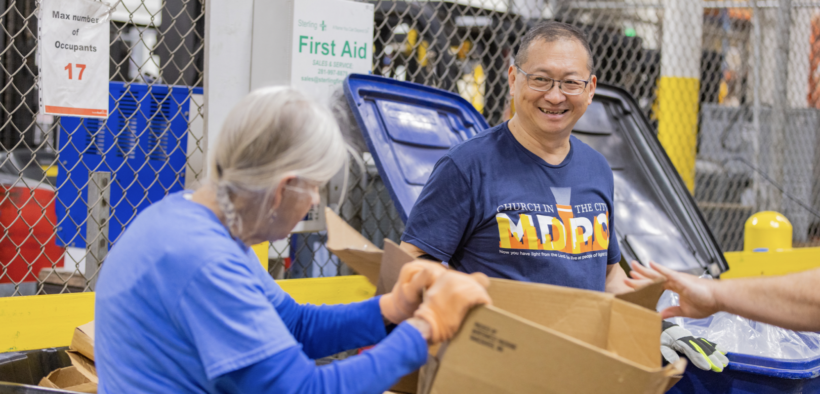Generous Churches: Memorial Drive Presbyterian Church Gives Away as Much as it Uses
The Houston church was founded on a principle of radical generosity.

Editor’s Note: This is the first in a series of articles on churches who have adopted a radical approach to generosity.
A clandestine nighttime operation to print bibles for Iranian Christians meant overcoming one big hurdle—a minimum of $3,000 to fire up the machines.

Enter the generosity of Memorial Drive Presbyterian Church (MDPC). During a morning worship service in 2017, congregation members learned of the opportunity, and instead of $3,000 they gave $17,000.
“Our church really responded,” said Amy Delgado, MDPC’s outreach director. “It is a privilege to partner with Jesus.”
Generosity has been part of MDPC’s DNA since it was founded in 1954 on three principles: discipleship, prayer, and radical generosity.
By radical generosity, MDPC means matching “dollar for dollar” the money spent each year on church operations with money given to those in need. Delgado said that was about $6.8 million last year.
The generosity and giving of the church attracts members of that same mindset, allowing the church to be even more generous. It is a healthy, self-perpetuating cycle, according to Delgado.
MDPC is a large church in Houston with about 4,000 members. When people attend the new member class and introduce themselves, the majority mention the reason they came to MDPC was its commitment to generosity.
Generosity at MDPC doesn’t just mean giving money, it also means giving time and engaging and serving in the community.
Access to MinistryWatch content is free. However, we hope you will support our work with your prayers and financial gifts. To make a donation, click here.
That’s why it works with so many local ministries to those in need. “We are highly relational and want to engage with the partners and have a meaningful impact on the community,” Delgado explained.
“Church in the City” is a service opportunity started in 2018 by MDPC. The church dedicates one Sunday in February to service. Rather than gathering to worship, the congregation participates in service projects with local ministry partners.
The projects vary from landscaping to painting to more family-friendly projects like bagging rice and beans, Delgado said. Over 1,000 church members have participated in the event since its inception. “It’s a force and it’s fun!” she said.
In addition to church members becoming more acquainted with local ministries, an unexpected development is that giving on those Sundays are higher than normal.
“Initially, there were some voices that were concerned that giving up a Sunday would impact our budget because we wouldn’t have that week’s collection, but we have found the inverse to be true. People give at or higher on that Sunday through online giving or the offering boxes,” Delgado said.
In 2023, MDPC is partnering with 89 local ministries and 36 global ministries and missionaries. Each of the partners is vetted by church committees who meet with the ministries and conduct on-site visits. They consider factors such as the impact of the group, how effective it is, and how responsible it is with its finances. The committee members receive training about evaluating ministries, such as how to read a Form 990.
While all of MDPC’s global partner ministries are faith-based, not all local partners are. Delgado says MDPC supports groups like the Houston Food Bank because they “do the best work” in the area of outreach to the hungry through which MDPC can have the most impact.
Generosity starts with God, who is generous to us. So it is fitting that His church be generous, Patrick Johnson, founder of GenerousChurch told MinistryWatch.
It is “trusting God’s provision and using all we have to bless others,” Johnson said, quoting Peter Greer’s definition of generosity. “It counters a mindset of scarcity,” he added, “and is whole life generosity.”
While generosity encompasses more than giving money, Johnson said it is not less than that.
He believes churches have a profound impact and witness to the world when they are radically generous. He noted that even secular historians who studied the early church found that one of the attributes that stood out was its radical generosity both within the Christian community and to those outside. When plagues would hit Roman cities, it was often Christians who stayed behind and cared for the dying, sharing their time and their resources.
That historical context shows that generosity is at the root of the Christian faith, Johnson said.
He also sees generosity as part of fulfilling the Great Commission. Once people come to faith in Christ, they are to be taught to “obey everything [Jesus has] commanded you.” And Jesus taught a lot about the proper use of money and resources, Johnson pointed out. Generosity is a subset of kindness in the list of the fruits of the Spirit.
Johnson is shocked at how many churches and believers don’t see generosity as a discipleship issue.
“I think we are missing it in the U.S. We don’t spend enough on the poor, the widow, the immigrant and the orphan…because God has such a heart for those groups. What we tend to do in our affluent Western churches is to isolate ourselves,” he said.
In Johnson’s experience, generous churches are some of the healthiest churches. One reason he cited is that generosity fights the tendency of an institution like a church to protect itself and become insular.
Main photo: Photo via social media



